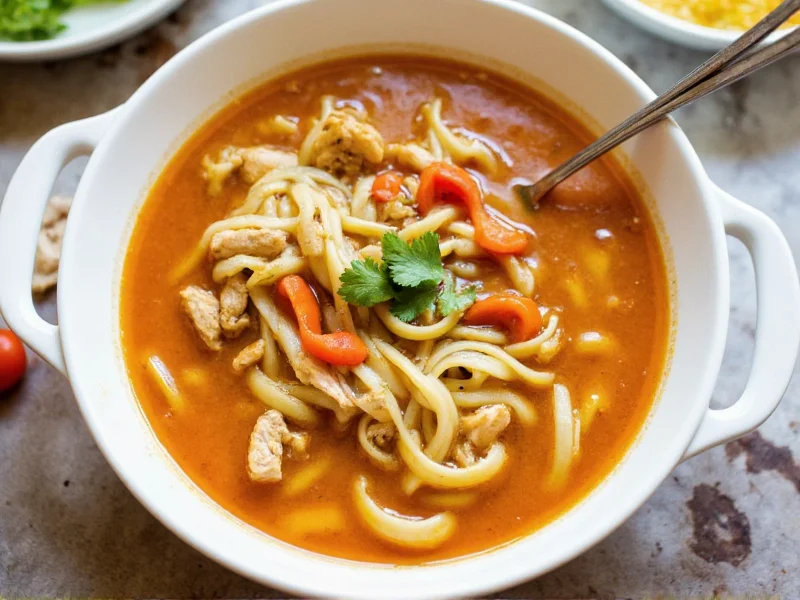Slow cooker chicken noodle soup transforms simple ingredients into a comforting masterpiece through gentle, extended cooking. Unlike traditional methods that demand constant attention, the slow cooking process extracts maximum flavor from bones and vegetables while keeping chicken exceptionally moist. This guide provides everything you need for perfect slow cook chicken noodle soup every time, including ingredient ratios, timing secrets, and customization options that work with any slow cooker model.
Why Slow Cooker Chicken Noodle Soup Works Best
The magic of slow cooking chicken noodle soup lies in temperature control and time. Cooking on low heat (typically 190-200°F) for 6-8 hours allows collagen in chicken bones to convert to gelatin gradually, creating a rich, velvety broth without cloudiness. This gentle process preserves vegetable integrity better than boiling, preventing mushy carrots and celery. For optimal results, use bone-in chicken pieces which impart more flavor than boneless cuts.
Essential Ingredients for Perfect Slow Cook Chicken Noodle Soup
Quality ingredients make the difference between good and exceptional soup. While traditional recipes work, these professional tips elevate your slow cook chicken noodle soup:
| Ingredient | Recommended Amount | Pro Tips |
|---|---|---|
| Chicken (bone-in) | 2-3 lbs | Thighs and drumsticks create richer broth than breasts |
| Low-sodium broth | 4 cups | Use chicken or vegetable for better flavor control |
| Carrots | 3 medium | Add in last 2 hours to prevent mushiness |
| Celery | 3 stalks | Include leaves for extra flavor dimension |
| Onion | 1 large | Yellow onions provide best flavor foundation |
| Egg noodles | 8 oz | Add during last 30 minutes of cooking |
Step-by-Step Slow Cook Chicken Noodle Soup Instructions
Follow these precise steps for foolproof slow cook chicken noodle soup:
- Prepare ingredients: Chop vegetables uniformly (½-inch pieces) for even cooking. Pat chicken dry with paper towels.
- Layer strategically: Place chicken at bottom of slow cooker, then add onions, garlic, herbs, and broth. Save carrots and celery for later.
- Cook chicken first: Set slow cooker to LOW and cook chicken and broth base for 4 hours before adding vegetables.
- Add vegetables: After 4 hours, add carrots, celery, and any additional vegetables. Continue cooking 2-3 more hours.
- Finish with noodles: Add cooked noodles during the last 30 minutes to prevent overcooking and starch cloudiness.
- Season wisely: Adjust salt and pepper after noodles are added, as starch affects seasoning perception.
Avoiding Common Slow Cooker Soup Mistakes
Even experienced cooks make these slow cook chicken noodle soup errors:
- Adding noodles too early: Egg noodles become mushy when cooked longer than 30 minutes in broth. Cook noodles separately and add to individual bowls.
- Overfilling the slow cooker: Never fill beyond ⅔ capacity to allow proper heat circulation and prevent boil-overs.
- Skipping the skimming step: After 2 hours, skim foam from surface for clearer, cleaner-tasting broth.
- Using high heat: Cooking on HIGH creates tougher chicken and cloudier broth. Low and slow always wins for soup.
Customizing Your Slow Cook Chicken Noodle Soup
Personalize your soup while maintaining structural integrity:
- Gluten-free version: Substitute rice noodles or quinoa pasta, adding during last 20 minutes
- Extra protein: Add white beans during last hour for vegetarian protein boost
- Herb variations: Try dill and tarragon for French-style soup, or thyme and rosemary for heartier flavor
- Spicy kick: Add red pepper flakes with vegetables or finish with hot sauce
Storage and Reheating Guidelines
Proper storage maintains quality for future meals:
- Cool soup completely before refrigerating (within 2 hours of cooking)
- Store broth and noodles separately for best texture when reheating
- Refrigerate for up to 4 days or freeze for 3 months
- Reheat gently on stove (not in slow cooker) to prevent overcooking
- Add fresh herbs after reheating for vibrant flavor restoration
Frequently Asked Questions
Can I use frozen chicken for slow cook chicken noodle soup?
Yes, but increase initial cooking time by 1-2 hours. Place frozen chicken at bottom of slow cooker with broth to ensure proper thawing. Never cook frozen chicken on HIGH setting as it creates uneven cooking and potential food safety issues.
How do I prevent vegetables from becoming mushy in slow cooker soup?
Add root vegetables like carrots and potatoes during the last 2-3 hours of cooking. For delicate vegetables like peas or spinach, stir in during the final 30 minutes. Cutting vegetables into uniform ½-inch pieces ensures even cooking without disintegration.
What's the ideal slow cook time for chicken noodle soup?
6-8 hours on LOW provides optimal results. Cooking less than 6 hours yields less flavorful broth, while exceeding 8 hours can make chicken stringy. The ideal window allows collagen to fully convert to gelatin without breaking down chicken structure.
Can I make slow cook chicken noodle soup without鸡汤 base?
Absolutely. Use water with extra vegetables (celery leaves, onion skins, garlic) and 2 tablespoons of tomato paste for depth. The slow cooking process extracts natural flavors from chicken bones and vegetables to create rich broth without store-bought bases.
Why does my slow cooker soup taste bland?
Blandness typically comes from insufficient seasoning layers. Season between stages: lightly salt chicken before adding, season broth after 4 hours, and adjust final seasoning after adding noodles. Acid (lemon juice or vinegar) added at the end brightens flavors that may seem muted during slow cooking.











 浙公网安备
33010002000092号
浙公网安备
33010002000092号 浙B2-20120091-4
浙B2-20120091-4